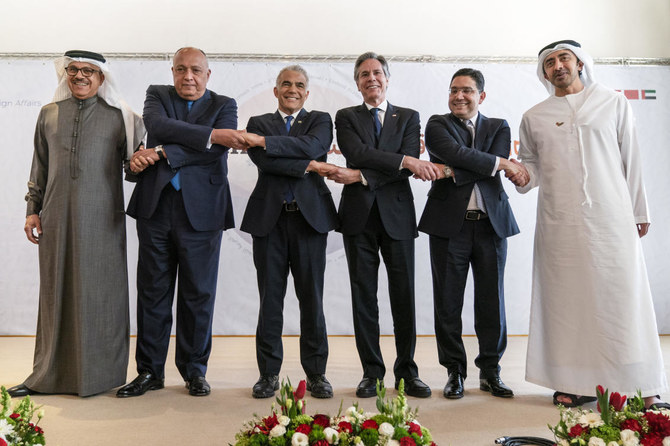The foreign ministers of Israel, the US, the UAE, Morocco, Bahrain and Egypt took part in a historic summit in Israel on Monday.
Ahmed Hafez, spokesman for Egypt’s Foreign Ministry, tweeted that Foreign Minister Sameh Shoukry arrived in Israel on Sunday and met with his Israeli counterpart Yair Lapid in a closed session before the Negev Summit. The six foreign ministers attended a joint dinner with their staff on Sunday evening.
The Israeli Foreign Ministry’s Arabic Twitter account said the recent peace deals signed with the UAE, Morocco and Bahrain herald “a better tomorrow for the peoples of the region.”
The account published a video of Israeli Prime Minister Naftali Bennett’s statements welcoming the summit’s participants.
“In the Middle East, there are those who create violence and backwardness, and on the other hand, there are those who push for cooperation, prosperity and peace,” he said.
“The realization is growing in the Arab world that Israel stands, and always has, in the trench of peace and cooperation.”
Bennett described the holding of the summit as “a very festive and influential day,” saying Israel is cultivating old ties and building new bridges.
“While we are talking about peace, there are parties that do not stop fanning the flames of war. And we got another reminder of that when the Houthis, acting as a proxy for the Iranian Revolutionary Guard, launched an attack targeting Saudi Arabia,” he added.
The summit was held five days after a meeting in Sharm El-Sheikh between the leaders of Egypt, Israel and the UAE, and two days after a summit in Aqaba that brought together Egypt’s president, Jordan’s king, the UAE crown prince and Iraq’s prime minister.
Lapid held talks on Monday morning with his US counterpart Antony Blinken, during which they discussed the Iranian nuclear issue and the Russia-Ukraine conflict.
Lapid said: “Iran is not an Israeli problem, as the entire world cannot afford Iran to become a nuclear power. We will take all possible actions to confront the danger of Iran’s nuclear program.”
He added that Israel will cooperate with the US to prevent Iran from acquiring nuclear weapons, despite their differences over an imminent nuclear deal with Tehran.
Blinken affirmed the US commitment to preventing Iran from acquiring nuclear weapons, and stressed continuing communication and coordination with Israel in this regard. He said Iran’s regional interference increased after the US withdrawal from the nuclear deal.

